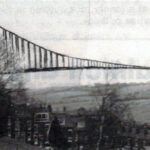29 July 1895: The Law Lords rule that Edward Pickles of Trooper’s Farm may, even in malice, divert water under his property away from Bradford’s Hewenden Reservoir
Daily News. 1895/07/30. A Landowner’s Rights. London. Get it:
.Unedited excerpt
If an excerpt is used in the book, it will be shorter, edited and, where applicable, translated.
The House of Lords … gave an interesting decision yesterday as to the extent to which owners of property may push their rights. The litigation had arisen out of dispute between the Corporation of Bradford … as the owners of the waterworks of that town, and Mr. Pickles, an adjacent landowner. Under local Acts of Parliament the Corporation are entitled to use a source of water known as Many Wells Springs, and they have formed a reservoir and conduits for the purpose of carrying the water to the town. Before reaching the Springs the water percolates through Mr. Pickles’s land, and he appears to have been desirous of making use of this fact so as to compel the Corporation to purchase his property. By draining his land he would have effectually cut off the supply of water, but he was too politic to give this out as his immediate object. He professed that he wished to work the stone under his land, and that to enable him to work it, it was necessary in the first place to get rid of the water. Accordingly he employed an engineer to construct plans of a proposed tunnel and drain, and these he laid before the Corporation with an intimation of what he was going to do. The Corporation, however, suspected that his real design was simply to deprive them of the water, and they brought an action to restrain him from doing so. The action was tried before Mr. Justice North, and upon the evidence the Corporation succeeded in satisfying that Judge that Mr. Pickles’s desire to work the stone was a mere blind. He did not, in fact, require his own land to be drained of the water, and his conduct was prompted by the desire to cut off the supply to the Many Wells Springs. This raised a point of law which has never before been decided in this country, which has now gone to the House of Lords. As a matter of legal right, there is no doubt that Mr. Pickles was entitled to divert the water. A landowner cannot divert the water of a stream so as to prevent it from passing on for the use of other owners lower down. But before the stream is formed, and while the water is percolating in undefined channels through the ground, no rights in it are acquired, and the landowner may divert it in any way he pleases. Can he then exercise this right, not to serve any useful purpose of his own, but solely to inflict an injury on his neighbour? It would have been been a reasonable limitation on the rights of landowners, especially in such a case as the present, if this question had been answered in the negative. It is difficult enough to secure an adequate supply of water for our large towns without having to buy off its wanton diversion by neighbouring landowners. But the House of Lords has decided to the contrary. Provided he does not interfere with the rights of others, he may do as he pleases with his own, and the Bradford Corporation, if they wish to secure the continued supply of water through the estate of Mr. Pickles, will have to come to terms with him.
Comment
Comment
Michael Taggart:
Part of the case’s enduring influence lies in its illustration of the 19th-century judges’ solicitude towards private property. Pickles illustrates the potency of the common law principle that whenever possible (and perhaps even when it is not possible) statutes will be interpreted by the courts to protect the property interests of individuals… The judges ignored or dismissed earlier dicta supporting [an exception for malice] in English, American, and Scottish cases, as well as in Roman law. In Continental Europe these Roman law seeds have flowered into a doctrine of abuse of rights, that first gook hold in France in the 19th century and has since spread like wildfire throughout the civil law.
And:
Pickles won the legal battle but lost the war. He succeeded in disrupting the water supply (although, it turns out, only temporarily), but the Corporation steadfastly refused to buy his land or his water. A few years later Edward Pickles sold the farm (the Corporation having refused to buy it), and he and his family emigrated to North America and disappeared without trace (Taggart 2002).
Something to say? Get in touch
Similar
 30 October 1744: Landowners form a partnership to pipe water from Little Horton to Bradford, facilitating urban growth
30 October 1744: Landowners form a partnership to pipe water from Little Horton to Bradford, facilitating urban growth 18 July 1848: The sanitation committee of Bradford Council experience the use of iron(III) chloride and iron(II) sulphate as sewage deodorants
18 July 1848: The sanitation committee of Bradford Council experience the use of iron(III) chloride and iron(II) sulphate as sewage deodorants Reproduction through the blind benevolence of Leeds Other Paper (RIP).1 April 1979: Amid motorway mania in Leeds, West Yorkshire Council is today to reveal plans to link Chapeltown and Woodhouse by a ¼-mile suspension bridge across Meanwood Beck
Reproduction through the blind benevolence of Leeds Other Paper (RIP).1 April 1979: Amid motorway mania in Leeds, West Yorkshire Council is today to reveal plans to link Chapeltown and Woodhouse by a ¼-mile suspension bridge across Meanwood Beck
Comment
Comment
Via Remember LOP, a feed by Tony Harcup which pays tribute to some splendid local journalism, unimaginable today.
Council sources claim the scheme was a victim of the first wave of cuts imposed by Margaret Thatcher following her General Election victory a month later.
Something to say? Get in touch
Search
Donate
Music & books
Place-People-Play: Childcare (and the Kazookestra) on the Headingley/Weetwood borders next to Meanwood Park.
Music from and about Yorkshire by Leeds's Singing Organ-Grinder.



 Bluesky
Bluesky Extwitter
Extwitter